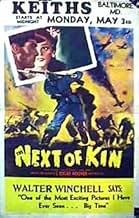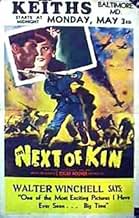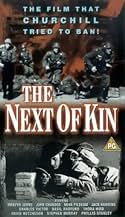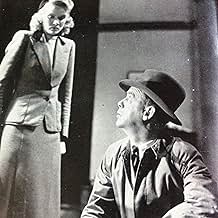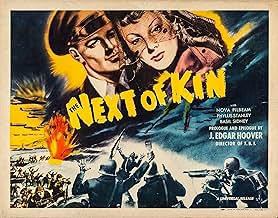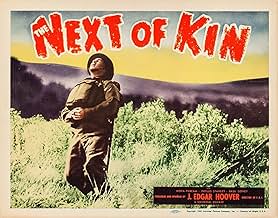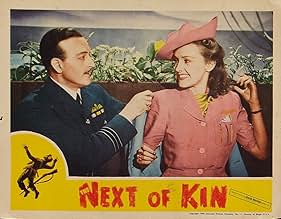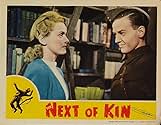Ajouter une intrigue dans votre langueA gossipy housewife is overheard talking about what her son is doing by a Nazi spy.A gossipy housewife is overheard talking about what her son is doing by a Nazi spy.A gossipy housewife is overheard talking about what her son is doing by a Nazi spy.
- Réalisation
- Scénario
- Casting principal
- Récompenses
- 2 victoires au total
- No. 23 (Mr. Davis)
- (as Ft. Lt. Mervyn Johns RAF.VR.)
- Maj. Richards
- (as Sqn-Ldr. Reginald Tate RAF.VR.)
- Mr. Barratt
- (as L/C Stephen Murray RASC)
- Intelligence Officer
- (as Ft-Lt. David Hutcheson RAF.VR.)
- Brigade Major Harcourt
- (as 2nd. Lt. Jack Hawkins RWF)
- German General
- (as Lt. Torin Thatcher R.A.)
Avis à la une
These days we're familiar with spy stories. We've seen so many of those films that we know the tricks of the trade. To us now its hammer over the head approach in getting the message across seems oddly unsubtle but this was aimed at a 1942 population. The audience back then didn't have our experience, they didn't know what we now know. Without wanting to sound patronising, they did need educating, they needed to be told. The pitfalls of having loose lips had to be spelled out in black and white.
This isn't like a normal picture but neither is it a dry preachy lecture on how to behave. The filmmakers knew what they were doing: they knew how to engage with their audience, they knew they had to make this both informative, exciting and above all else, entertaining. It's very different to most wartime morale boosting movies, in fact as Churchill noted, it's quite depressing. That's what is so powerful about it - if you aren't careful, you, yes you might personally plunge the world into a living nightmare.
Besides being a genuinely entertaining piece of cinema, it's a genuinely important piece of history, an actual part of the war effort which we can now experience for ourselves.
The paradoxical result was that a film at first only intended for strictly limited circulation amongst those with security clearance became a great box office hit. Equally paradoxical was the degree of really quite startling realism - especially for the time - with which it convincingly presented certain uncomfortable realities of war to the domestic audience; the only concession to any kind of comforting assurance being the explosive finale when, despite horrifying casualties amongst the invasion force whose plans have been compromised by enemy agents, the commandos are able to press on and successfully sabotage their strategic military objective on the coast of occupied France.
The location filming of authentic training manoeuvres in and around the Cornish village of Megavissey is superb, and does not pull its punches in showing bodies blown to bits, etc. The remarkable live sound recording gives a really stomach-tightening sense of the military hardware being unleashed: The sounds of the actual artillery, bombs, and powerful engines actually mobilized for War contribute to a far greater urgency than what audiences were used to. Even now, it is abundantly clear that CGI pyrotechnics, by comparison, just do not pack the requisite punch.
The script cleverly and effectively alerts its audience to the very real danger of 'careless talk' and even deals unblinkingly with such unsavoury real-life scenarios as a cocaine-addicted stripper being blackmailed into spying on her soldier boyfriend by her Nazi-sympathising dresser; or a cultivated bookshop owner who is in reality a ruthless Nazi agent, and perfectly prepared to blackmail his young assistant into obtaining information by threatening to arrange that her Jewish parents, whom she has had to leave behind in occupied Amsterdam when she became a refugee, are detained in 'protective custody;' or the mild little businessman from Wales who strolls around undetected and undetained throughout the film, stealing information with alarming ease, to the untold advantage of his country's deadly foe.
These Nazi spies are not the usual easily-defeated Prussian blockheads beloved of more naive propaganda films, but intelligent, sophisticated and well-trained agents, supplied with detailed cover, a network of contacts, and portable radios. They represent an all-too-believable and imminent threat to Britain's survival.
One cannot help reflecting that this clear-eyed view of Britain's predicament stands now in stark contrast to the present era of lies and dissimulation. Churchill thought - quite reasonably during such an extreme emergency - of banning this film, but eventually reconsidered, since the military authorities of the time were ultimately prepared to trust the people of Britain with something surprisingly close to the truth. I venture to state that, evidently, people were trusted more by their governors during the global crisis of a World War, when national survival unquestionably stood in far greater danger of sudden catastrophe, than they are today!
If it had not been on YouTube.com I would never have seen this excellent film as it never appears on UK television despite the existence of various heritage channels.In fact "London Live" for example keeps repeating Ealing films they have already transmitted when there are plenty of other vintage films like the present one they could show for us vintage film aficionados.
There is as usual the dry humour one associates with even the most single-minded British wartime propaganda (some of the peripheral detail is even quite racy, and the wartime censor permitted a reference to cocaine addiction)!
Among a large cast of familiar faces the use of Mary Clare is particularly striking, while Phyllis Stanley is a fox as the film's Mata Hari. But the final scene with two old favourites manages to surpass all that has gone before.
Essential viewing: I would love to know what Goebbels made of it!
Le saviez-vous
- AnecdotesThe War Office asked Ealing to make a feature length training film for them on the subject of security, but provided minimal funds. Ealing more than doubled the budget from their own resources, to produce a film whose appeal transcended its military function. The very large profits from commercial distribution went first to repay this outlay, then to the War Office rather than Ealing.
- GaffesWhen Beppie meets her soldier boyfriend near his north of England training ground, he is standing by a Western National bus stop. Western National only operated in the South West of England, not the North.
- Citations
Narrator: [Spoken as camera pans across dead soldiers after the battle sequence] The object of the raid has been achieved. Locked gates, oil storage tanks, harbour equipment were destroyed. One enemy submarine was put out of action, our own losses, both in men and craft were very heavy. The enemy had been warned. He was waiting for us. And although our troops fought throughout with great skill and gallantry, they were not able to effect the surprise that had been hoped for. They paid the price for bad security. The next of kin of causalities' have been informed.
- Crédits fousSECURITY This is the story of how YOU - unwittingly worked for the Enemy, YOU - without knowing gave him the facts, YOU in all innocence helped to write those tragic words - 'THE NEXT OF KIN'
- ConnexionsFeatured in L'étrange aventurière (1946)
Meilleurs choix
Détails
- Durée
- 1h 42min(102 min)
- Couleur
- Rapport de forme
- 1.37 : 1

